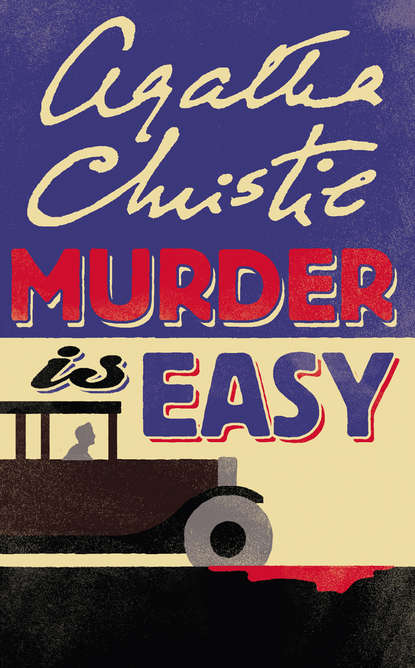‘Yes, he was popular enough on the whole,’ admitted Lord Whitfield. ‘Though I know one or two people who had it in for him. Pig-headedness again.’
‘One or two of the people living here?’
Lord Whitfield nodded.
‘Lots of little feuds and cliques in a place like this,’ he said.
‘Yes, I suppose so,’ said Luke. He hesitated, uncertain of his next step.
‘What sort of people live here mostly?’ he queried.
It was rather a weak question, but he got an instant response.
‘Relicts, mostly,’ said Bridget. ‘Clergymen’s daughters and sisters and wives. Doctors’ dittoes. About six women to every man.’
‘But there are some men?’ hazarded Luke.
‘Oh, yes, there’s Mr Abbot, the solicitor, and young Dr Thomas, Dr Humbleby’s partner, and Mr Wake, the rector, and—who else is there, Gordon? Oh! Mr Ellsworthy, who keeps the antique shop and who is too, too terribly sweet! And Major Horton and his bulldogs.’
‘There’s somebody else I believe my friends mentioned as living down here,’ said Luke. ‘They said she was a nice old pussy but talked a lot.’
Bridget laughed.
‘That applies to half the village!’
‘What was the name now? I’ve got it. Pinkerton.’
Lord Whitfield said with a hoarse chuckle:
‘Really, you’ve no luck! She’s dead too. Got run over the other day in London. Killed outright.’
‘You seem to have a lot of deaths here,’ said Luke lightly.
Lord Whitfield bridled immediately.
‘Not at all. One of the healthiest places in England. Can’t count accidents. They may happen to anyone.’
But Bridget Conway said thoughtfully:
‘As a matter of fact, Gordon, there have been a lot of deaths in the last year. They’re always having funerals.’
‘Nonsense, my dear.’
Luke said:
‘Was Dr Humbleby’s death an accident too?’
Lord Whitfield shook his head.
‘Oh, no,’ he said. ‘Humbleby died of acute septicæmia. Just like a doctor. Scratched his finger with a rusty nail or something—paid no attention to it, and it turned septic. He was dead in three days.’
‘Doctors are rather like that,’ said Bridget. ‘And of course, they’re very liable to infection, I suppose, if they don’t take care. It was sad, though. His wife was broken-hearted.’
‘No good rebelling against the will of providence,’ said Lord Whitfield easily.
‘But was it the will of providence?’ Luke asked himself later as he changed into his dinner jacket. Septicæmia? Perhaps. A very sudden death, though.
And there echoed through his head Bridget Conway’s lightly spoken words:
‘There have been a lot of deaths in the last year.’
CHAPTER 4 (#ulink_54b77604-ad67-588b-bff8-d958ab850e71)
Luke Makes a Beginning (#ulink_54b77604-ad67-588b-bff8-d958ab850e71)
Luke had thought out his plan of campaign with some care, and prepared to put it into action without more ado when he came down to breakfast the following morning.
The gardening aunt was not in evidence, but Lord Whitfield was eating kidneys and drinking coffee, and Bridget Conway had finished her meal and was standing at the window, looking out.
After good-mornings had been exchanged and Luke had sat down with a plentifully heaped plate of eggs and bacon, he began:
‘I must get to work,’ he said. ‘Difficult thing is to induce people to talk. You know what I mean—not people like you and—er—Bridget.’ (He remembered just in time not to say Miss Conway.) ‘You’d tell me anything you knew—but the trouble is you wouldn’t know the things I want to know—that is the local superstitions. You’d hardly believe the amount of superstition that still lingers in out-of-the-way parts of the world. Why, there’s a village in Devonshire. The rector had to remove some old granite menhirs that stood by the church because the people persisted in marching round them in some old ritual every time there was a death. Extraordinary how old heathen rites persist.’
‘Dare say you’re right,’ said Lord Whitfield. ‘Education, that’s what people need. Did I tell you that I’d endowed a very fine library here? Used to be the old manor house—was going for a song—now it’s one of the finest libraries—’
Luke firmly quelled the tendency of the conversation to turn in the direction of Lord Whitfield’s doings.
‘Splendid,’ he said heartily. ‘Good work. You’ve evidently realized the background of old-world ignorance there is here. Of course, from my point of view, that’s just what I want. Old customs—old wives’ tales—hints of the old rituals such as—’
Here followed almost verbatim a page of a work that Luke had read up for the occasion.
‘Deaths are the most hopeful line,’ he ended. ‘Burial rites and customs always survive longer than any others. Besides, for some reason or other, village people always like talking about deaths.’
‘They enjoy funerals,’ agreed Bridget from the window.
‘I thought I’d make that my starting-point,’ went on Luke. ‘If I can get a list of recent demises in the parish, track down the relatives and get into conversation, I’ve no doubt I shall soon get a hint of what I’m after. Who had I better get the data from—the parson?’
‘Mr Wake would probably be very interested,’ said Bridget. ‘He’s quite an old dear and a bit of an antiquary. He could give you a lot of stuff, I expect.’
Luke had a momentary qualm during which he hoped that the clergyman might not be so efficient an antiquary as to expose his own pretensions.
Aloud he said heartily:
‘Good. You’ve no idea, I suppose, of likely people who’ve died during the last year.’
Bridget murmured:
‘Let me see. Carter, of course. He was the landlord of the Seven Stars, that nasty little pub down by the river.’








 Рейтинг:
0
Рейтинг:
0